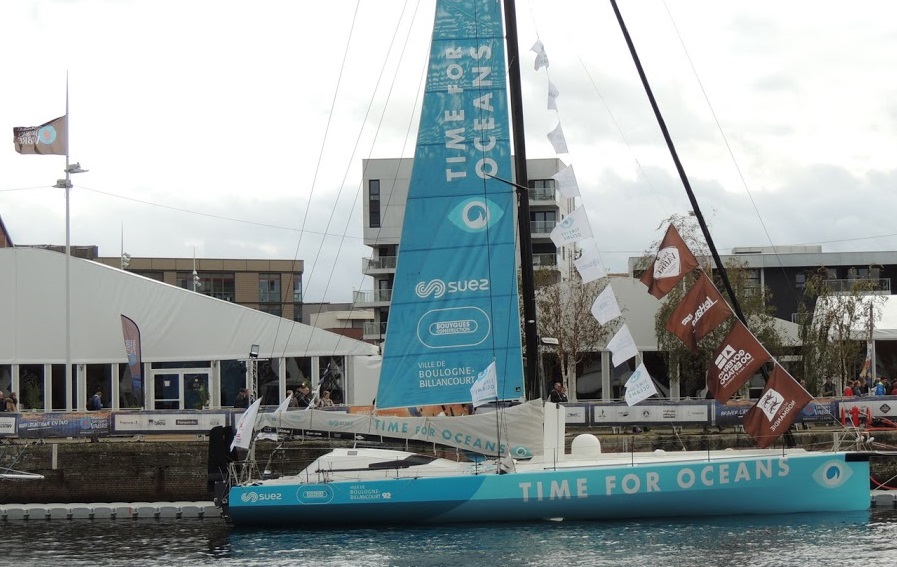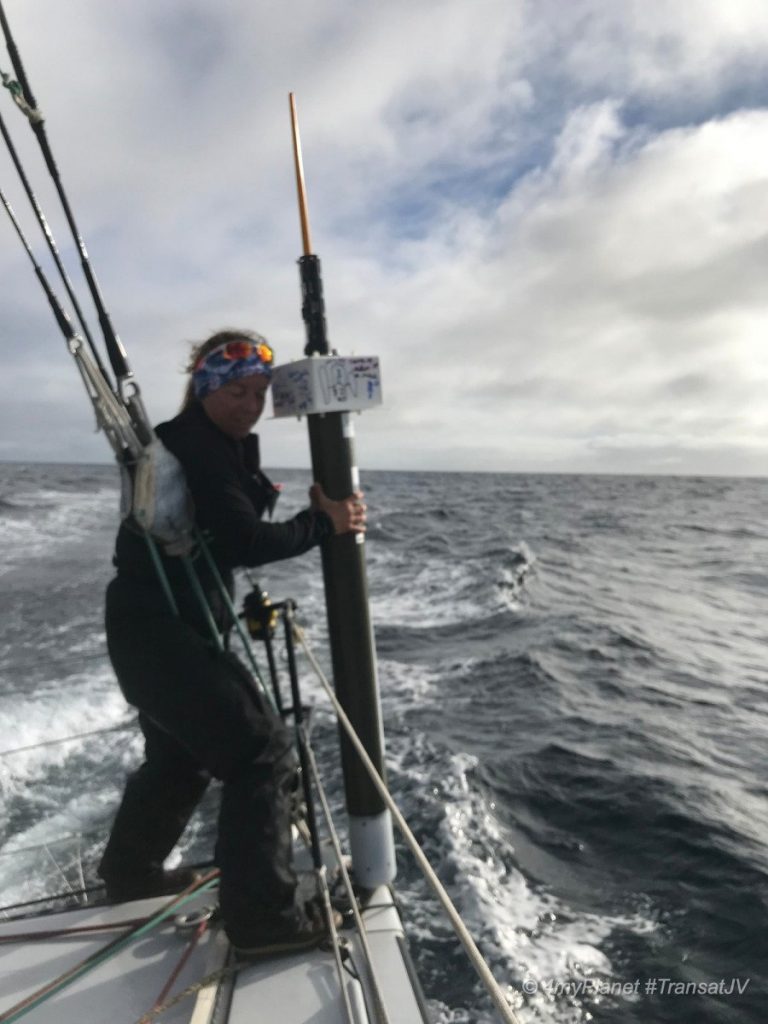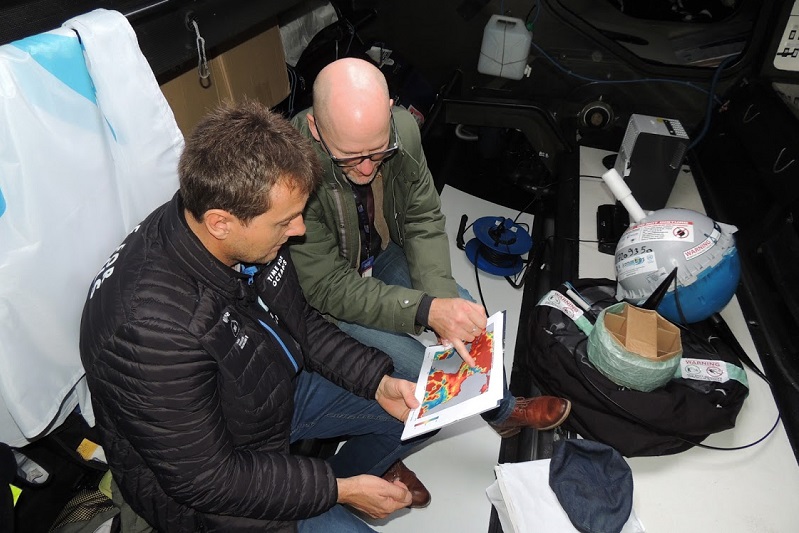Ocean races contribute to understanding climate change
- October 30, 2019
- Category: Flash info

On Sunday, October 27th, 2019, 59 vessels left Le Havre, on France’s Normandy coast, bound for a fabulous journey across the Atlantic Ocean, over the Equator and down to Salvador de Bahia, in Brazil. Twenty-nine IMOCA class vessels participate in the Transat Jacques Vabre, a 4,350 mile trip that will take between ten and seventeen days depending on the vessel type.
During their journey, the skippers will be in contact with the elements: subject to the trade winds, held hostage by the doldrums, or caught up in unpredictable currents. But the challenges of nature will not prevent them from contributing to ocean sciences. Along their way, skippers will gather precious data to contribute to improving numerical weather modeling and understanding climate change.
Raising awareness about the ocean

Offshore racing is a sport where the he natural backdrop is the Ocean. Skippers are therefore the first to see mankind’s impact on its environment. That is why the IMOCA class has developed what is called the “Oceans Programme” , engaging the IMOCA class to take action by generating a beneficial impact, in four key areas, including event management, ecological transition, awareness, and ocean sciences.
In 2015 the IMOCA class and UNESCO’s Intergovernmental Oceanographic Commission (IOC) confirmed a formal partnership with the aim to gather climate data either with permanent onboard instrumentation, or by deploying autonomous instruments in remote ocean areas, set up educational programs and raise awareness for environmental issues. The renewal of this partnership was announced prior to the race start and will comprise a number of joint activities, with the 2020-21 Vendée Globe Race around the world leading into the United Nations Decade of Ocean Science for Sustainable Development.
Argo profiling floats to observe key ocean parameters below the surface
Within this framework, three teams from the 2019 Transat Jacques Vabre agreed to deploy valuable ocean sciences equipment on behalf of JCOMMOPS, Ifremer and Météo France, making precious observations of our changing oceans over the course of their voyage. This includes navigator Alexia Barrier and co-skipper Joan Milloy (4my Planet), who deployed an Argo profiling float on the morning of October 28th, off the Bay of Biscay, France.
The Argo profiling float they deployed will measure temperature, salinity and pressure profiles down to 2,000 m below the surface of the Atlantic Ocean during ten-day cycles. When the float surfaces, it will use the Argos satellite telemetry system to relay collected data. The data will be processed by the Argos data processing center and posted to the GTS for integration into climate and weather prediction models.
CLS, unique provider of Argos satellite telemetry services for scientific and environmental applications, also provides Iridium airtime services for Argo floats. CLS provides special data processing (DAC) and secure data hosting services upon request. This is made possible thanks to CLS’ IT infrastructure and staff, ensuring high availability and 24/7 monitoring of the services.
TRUSTED buoys to monitor sea surface temperature

In addition, navigator Boris Herrmann and co-skipper Will Harris (Malizia) and navigator Stéphane le Diraison and co-skipper François Guiffant (Time for Oceans) will deploy two special drifting buoys able to make high resolution sea surface temperature measurements (HRSST). These buoys, known as TRUSTED buoys, were developed in a Copernicus-funded project for EUMETSAT and are part of a fiducial reference system that provides HR SST measurements to validate the radiometers onboard Europe’s Sentinel-3 satellite, dedicated to oceanography, meteorology and climatology.
The TRUSTED buoys will be deployed when crews enter a pre-defined, undersampled zone, near the equator. CLS provides the necessary Iridium hardware and airtime services, as well as expert data processing activities allowing the data to be posted on the Global Telecommunication System (GTS) of the World Meteorological Organization (WMO) for inclusion in numerical weather forecasting models. The data will also be available through the CMEMS in situ data portal. The precision of the HRSST sensors on board this buoy detects small variations in temperature, providing unprecedented observations for climate studies.
Advancing ocean sciences and observation systems
In addition to these deployable instruments, some IMOCA class vessels have permanent systems installed on their vessels to collect sea surface parameters along the race course.
The deployment of these systems has been entirely coordinated by JCOMMOPS, the IOC’s UNESCO and the World Meteorological Organization (WMO) operational centre, which internationally coordinates about 10,000 in situ ocean observing instruments for continuously monitoring the global ocean and the atmosphere above it.
Congratulations, JCOMMOPS, and IMOCA class ocean races, for your important contribution to ocean observing systems.
Watch the video of Time for Oceans skipper Stéphane le Diraison deploying the TRUSTED buoy:
Watch the video of Malizia crew deploying the TRUSTED buoy:
About the IMOCA skippers of the Transat Jacques Vabre
https://www.transatjacquesvabre.org/fr/skippers/imoca
About JCOMMOPS
The WMO-IOC Joint Technical Commission for Oceanography and Marine Meteorology in situ Observations Programme Support Centre (JCOMMOPS) plays an important role in international ocean observations. Based in Brest, France, JCOMMOPS provides essential data and tools, as well as a centralized information and technical support facility, required for coordinating and integrating many of the world’s operational ocean observing networks, including the DBCP, OceanSITEs, SOT, GO-SHIP, Argo, and Ocean Gliders.
About CLS
CLS provides a range of airtime and value-added processing solutions to obtain remote, high frequency ocean observations from around the globe and contributes to major international oceanography programs. Unique Argos service provider, world-renowned certified Iridium VAR, and shareholder for Kinéis, an IoT/satellite hybrid solution, CLS offers an unparalleled range of services for the future of ocean observation networks, topped by excellent support.
